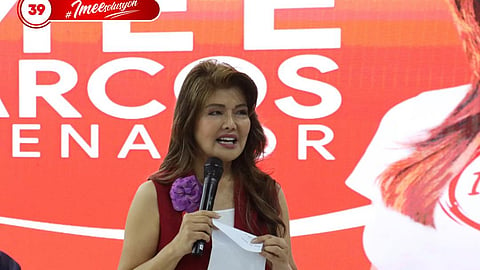
- NEWS
- the EDIT
- COMMENTARY
- BUSINESS
- LIFE
- SHOW
- ACTION
- GLOBAL GOALS
- SNAPS
- DYARYO TIRADA
- MORE

Senator Imee Marcos on Tuesday raised concerns over conflicting directives from Malacañang regarding Cabinet officials’ participation in the upcoming second Senate inquiry into the arrest of former President Rodrigo Duterte.
Just days after President Ferdinand Marcos Jr. stated that he would not prevent any executive branch officials from attending the Senate Committee on Foreign Relations’ investigation, Executive Secretary Lucas Bersamin sent a letter informing the Senate that no Cabinet officials would be present at the second hearing on 3 April.
“Who should be followed? Executive Secretary Bersamin’s statement contradicts President Marcos’,” Senator Marcos pointed out, saying the government should avoid creating confusion over transparency and accountability.
“They can’t have separate decisions on this. What’s the point of the President’s word if they won’t even follow it?” she said, wondering if there was another force within the administration calling the shots.
The senator also expressed her disappointment, emphasizing that many questions surrounding Duterte’s arrest remained unanswered.
“My report was only preliminary, so it feels incomplete. The public is still asking — I’m getting messages, people are inquiring, and new information is coming in,” she said, after her committee held its first hearing on 20 March.
Marcos said the hearings could provide a crucial opportunity for government officials to clarify the controversial arrest of Duterte, which has been labeled illegal by some quarters.
“This hearing could have been an opportunity to clarify conflicting answers, inconsistent data, and the pressing questions of the people,” she added, stressing that the public has a right to know the full story.
In a briefing on Sunday, Presidential Communications Undersecretary Claire Castro was asked if President Marcos had given any special instructions to government officials regarding the upcoming hearing.
“No, as we said the other day, the President will not stop Cabinet members or secretaries if they are summoned. And they should answer any questions that are asked of them, provided that it does not violate executive privilege, that’s all,” Castro said.
In the letter sent to Senate President Francis “Chiz” Escudero and Senator Marcos, Bersamin explained that the participation of government officials “may no longer be necessary at this time.”
He said that the officials had “dutifully attended” the initial hearing on 20 March and had “sincerely answered all the questions to the best of their knowledge,” providing “all information elicited by the Senate committee members.”
“Given the extensive disclosures made, we believe that further participation may no longer be necessary at this time, especially considering that the honorable chairperson has publicly relayed her comprehensive findings thereon,” Bersamin said.
Bersamin reiterated the Palace’s stance on executive privilege, which was outlined in its letter to Escudero and Marcos on 20 March.
He also cited the four pending petitions before the Supreme Court regarding Duterte’s arrest and surrender, which he said were “closely intertwined” with the matters being deliberated in the Senate hearings.
“Accordingly, further discussions on the matters on the agenda of the hearing may constitute a violation of the sub judice rule, which could unduly influence the ongoing proceedings,” Bersamin wrote.
This is not the first time executive privilege has been invoked in the Philippines.
Former President Gloria Macapagal-Arroyo used it in 2005 with Executive Order 464, which required department heads to obtain presidential consent before appearing in any congressional inquiry. The controversial order sparked debates about the limits of executive privilege and its use to shield government officials.
In the landmark case Senate v. Ermita (2006), the Supreme Court outlined the scope of executive privilege, stating that while the President can invoke it, the privilege can be overridden if the information is crucial to Congress’ legislative or oversight functions.
The Neri v. Senate Committee case further ruled that executive officials may request a closed-door session if the matter involves the “security of the state or public interest.”
Former president Duterte also invoked executive privilege in 2021, when he prevented then Presidential Security Group Commander Brig. Gen. Jesus Durante III from testifying before a congressional probe into the illegal entry and use of unauthorized China-made Covid-19 vaccines in the country.
In response to Bersamin’s invocation of executive privilege, Senator Escudero emphasized that executive privilege is not a “blanket shield.”
“It is important to note that this privilege cannot be used to prevent testimony in all cases. It should be limited and cannot serve as an excuse to withhold information that is critical to public accountability,” he said.
The Senate inquiry is an ongoing investigation into the circumstances surrounding Duterte’s arrest, which some believe was conducted without proper legal grounds.
Duterte’s supporters have argued that the arrest violated his constitutional rights, especially since no warrant was issued by a Philippine court, and they contend that the arrest did not fall within the exceptions of a warrantless arrest.
